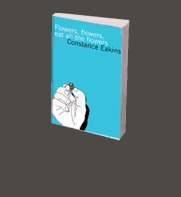This poem, written in staves of terza rima, tells the story
of Albertine, a young woman with a troubled spirit. Albertine’s
beloved boyfriend abandons her to go on a voyage to a distant
land. He refuses to tell her his destination, and only says that
it lies “beyond the moon.” Albertine’s malaise
is further aggravated by the fact that there is a dismal drought
in the part of southern Louisiana where she lives, in a small
town outside of New Iberia. The water level of the Mississippi
River is precipitously low. The wells, and even many of the swamps,
have dried up. Parched and irritable, she walks behind her house
and into the woods. She comes across a creek and follows it around
a bend, where turtles lie stuck in the drying mud of the riverbed.
With a start she notices a wizened old man sitting in a beached
canoe. There is a huge tear in the canvas of the boat’s bow.
She asks what he is doing sitting there like that, and on her family’s
property no less.
“Why,
mending this canoe, of course,” says the stranger. “The creek was
drying up and I ran into this rock here. It is difficult repair work but I
am an expert at mending canoes. Feel free to sit and observe my expertise.
I wouldn’t object to your company.”
“But there is no longer enough water in this creek and it does not reach
the river for many miles yet. How will you carry it through the forest?”
“I will not attempt a portage, if that’s
what you’re asking,” says
the man, “especially not with these old bones.” Albertine
notices that he is fashioning a patch out of twigs and mud to
cover the tear in his boat. “When the mud dries,” he
says, “it will act as glue
and I will have a sea-worthy vessel once more.”
Albertine
watches as the Mender of Canoes pathetically cobbles together
his dirt and twigs. She sees in the back of his canoe a sleeping
bag, a mess kit, and a large rucksack. Her aggression dims.
“If you’re going to be here for a while, it would be better if
you didn’t starve,” she says. She runs back to the house, returning
later with a plate of crawfish her mother boiled the night before.
“Greatly obliged, m’am,” says
the Mender of Canoes. He has finished his mud patch by now, and
is reclining in his boat. When it grows dark she invites him
to camp on her property for the night, but he insists on sleeping
in the canoe. He doesn’t want to be absent lest it rains
somewhere up north and the water rushes back through the creek.
But
it does not, so every day after chores Albertine comes to visit
him. At night she dreams wild nightmares but the sight of the
man sitting in his canoe is her salvation. Besides feeding him
leftovers she drops in her handkerchief during her meals, she
shares her water portion with him, and he drinks lustily, careful
not so spill a drop. They speak for hours, or as long as she
can get away from the house without arousing her mother’s
suspicion. She discovers that he is a canoe-wanderer, traveling
wherever his humble vessel can carry him, but never any further.
He comes from a long line of canoe-wanderers, a once common trade
that has become endangered in the modern age. He speaks with
nostalgia and not a little bitterness, but is gentle with Albertine,
as if trying to keep from her a dark secret that would do harm
her to hear. They discuss the woods, long-distance travel, lands
beyond the moon, and other subjects of mutual interest. She never
speaks about her lost love, and he never discloses where he is
headed, although she does gather that he has an ailing brother
he wants to visit before either of them die. She doesn’t
press him for details, but it is implied that the brother is
lying prostrate in a canoe floating on some lake in the north
country.
Albertine is afraid that if she finds out too
much about the canoe-mender, he might become real and leave her
behind. She does not want to be abandoned for far-off lands again.
Nevertheless she hands him a letter she has written for her boyfriend,
just in case the Mender of Canoes happens to encounter him at
some point during his travels. The letter is a profession of
loneliness, fear, and love, and nothing more. The Mender of Canoes
takes it with a nod and says nothing.
One morning Albertine’s
fear comes true. At the clearing in the woods she drops her bowl
of porridge and it cracks open on a rock. The dry rocks and sediment
have been overwhelmed by a loud, rushing stream. The water is
higher than she can ever remember it, and it spills onto the
shore, funneling down a precipice and over her sandals. She looks
up into the sky and, sure enough, she sees on the horizon a set
of black clouds messy like smudged charcoal. The ferocity of
the creek portends a powerful and violent storm.
Yet despite her
new friend’s absence, a sudden mirth overtakes
her. That night, when she stares up at the moon, she is sure
she sees the silhouette of his canoe paddling there, across the
Sea of Crises, the Sea of Vapors, and through a tributary to
the Ocean of Storms, carrying her letter all the way, toward
the other side of the moon.
|

